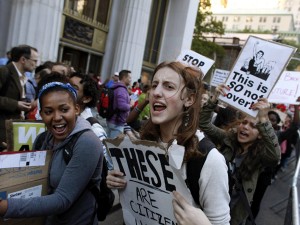
Occupy Wall Street protesters march towards Zuccotti Park in New York's Financial District, Wednesday. Protests against Wall Street entered their 18th day Tuesday as demonstrators across the country show their anger over the wobbly economy and what they see as corporate greed by marching on Federal Reserve banks and camping out in parks from Los Angeles to Portland, Maine. AP
NEW YORK—For weeks, a cluster of computerized protesters have camped in a park near Wall Street, telling the world how they believe America’s billionaires destroyed the economy.
Suddenly, Wednesday afternoon, the typing stopped — when the world got news of the death of inventor Steve Jobs.
“A ripple of shock went through our crowd,” said Thorin Carlsto, who helps lead Occupy Wall Street’s web-based movement.
That evening, men and women gathered at computers near him “expressed their sadness; they stopped typing and reflected on life — and his life.”
Protesters say they link protest plans in various cities with the aid of computers, many made by Apple, the company founded by the high-tech pioneer who died at age 56.
In addition, Manhattan’s Zuccotti Park, the protesters’ round-the-clock encampment, is sprinkled with Apple iPhones, iPods and iPads sending messages around the globe.
Jobs’ products are used to generate Wall Street billions, acknowledged Carlsto. But there was no irony in mourning, or celebrating, this billionaire while opposing many others who are just as wealthy.
“They had a less positive impact on society than Jobs,” said Carlsto. He said this was despite the fact that Jobs was “among the 1 percent” of the country’s population protesters keep citing as having accumulated 40 percent of the wealth.
At 7 p.m. Thursday, Carlsto requested a moment of silence from the hundreds of protesters in Jobs’ honor.
Earlier in the day, while President Obama delivered a live, televised speech, “there was a lot more talk here about Steve Jobs,” said Carlsto, 37, a trained electrical engineer who runs an antiques shop in Plainfield, Conn.
Many of the high-tech rebels considered Jobs “a leader, a pioneer,” said Carlsto. “He made it easier for humans to communicate, and that’s what we’re doing, sharing our message.”
Jobs was different from those on Wall Street who generate vast fortunes, he said.
“I dislike billionaires with a complete disregard for the future of the human race, to make money,” he said, taking a deep puff from his cigarette as he sat on a stone park wall, with the sun setting over lower Manhattan.
There are billionaires and then, there was “this different, quiet billionaire,” said Carlsto.
“He was a beneficial member of the human community.”